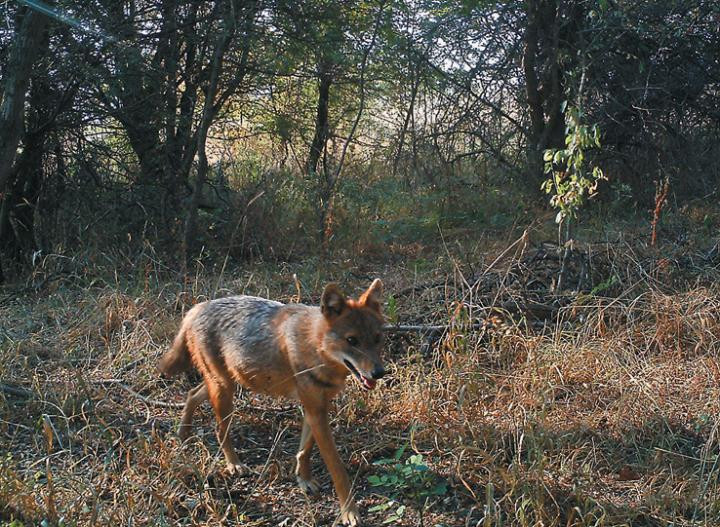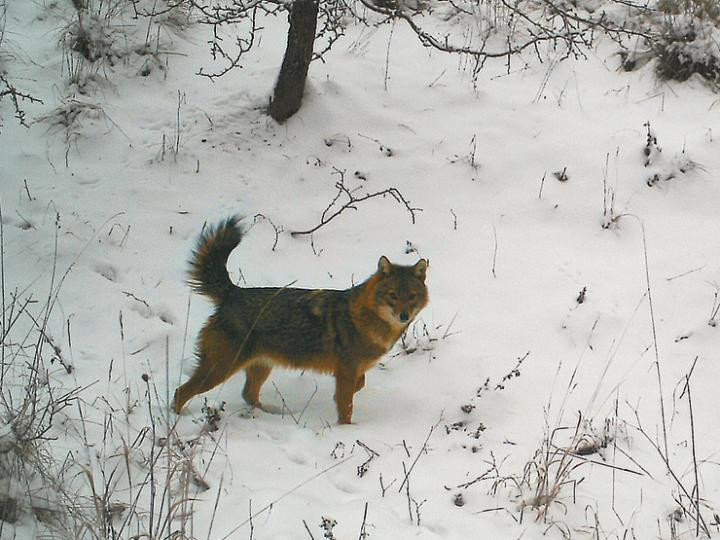First live golden jackal seen in the countryside near Prague - and it looks like it's there to stay
A golden jackal has never been pictured alive before and living wild in the Czech Republic.
An intrepid golden jackal has been caught on camera exploring Czech forests within 40km of Prague.
There have been reports of roadkill of golden jackals since the mid-1990s, but now masters student Klára Pyšková at Charles University in Prague caught the first images of a living golden jackal on the outskirts of the capital using a camera trap.
Golden jackals are not native to the Czech Republic, and this is the first time that one of the species has settled in the country. Only one jackal has been snapped by camera traps, appearing a total of 57 times over a period of nine months. This timespan suggests that the jackal is living consistently in the country and has made it its home.
The pictures have helped reveal something of the animal's daily habits. It was snapped most frequently between 4am and 10am and between 6pm and midnight, suggesting that it has two peaks of activity as part of its circadian rhythm.

Pyšková was monitoring an area of about 90sq km as part of a project on carnivores in Central Europe, but didn't expect to spot a live jackal.
Eurasian golden jackals usually live in the Balkan states, and it was most often seen in the Czech Republic in landscapes similar to those found in its native habitat, Pyšková said in a statement. Another species known as the golden jackal lives in east Africa, but this jackal is actually a type of wolf.
"It is one of the warmest areas in the country, with mild winters. The observed animal was mostly active at dusk and dawn, with majority of the sightings occurring in the morning hours," she says.
Golden jackals have been expanding steadily through Europe, Claudio Sillero, a conservation biologist at the University of Oxford, told IBTimes UK.
"Golden jackals are a resilient and successful carnivore. Their range has been expanding steadily into eastern and southern Europe, and in all likelihood this expansion will continue. They are able to feed in a variety of prey, and adapt readily to many habitats, including human-dominated ones."
Their diet can occasionally bring them into conflict with farmers, says Sillero, as they prey on small mammals, including livestock, as well as fruit, eggs and chicks.
The jackal migrated to the Czech Republic without human help, so it cannot be called an invasive species, Pyšková says. Nor can it be considered a native species, because it has historically not lived in the country.

However, it's possible that human activity is indirectly the cause of the unusual sight of a golden jackal in the Czech Republic, through climate change.
"Ongoing global change is bringing about shifts in species distributions that include both the spread of populations of invasive species and range expansions or contractions of native biota," Pyšková and her co-authors write in a paper on the findings published in the journal ZooKeys.
"In Europe, this is typically reflected in species moving from the south-eastern part of the continent to the north-west, most often in response to increasing temperatures that allow organisms to colonise areas that were previously unsuitable."
Other possible causes for the jackal's expedition to the north include human-caused changes to the landscape making it particularly inviting, and that the species is just very adaptable to new habitats, the authors write.
© Copyright IBTimes 2025. All rights reserved.






















